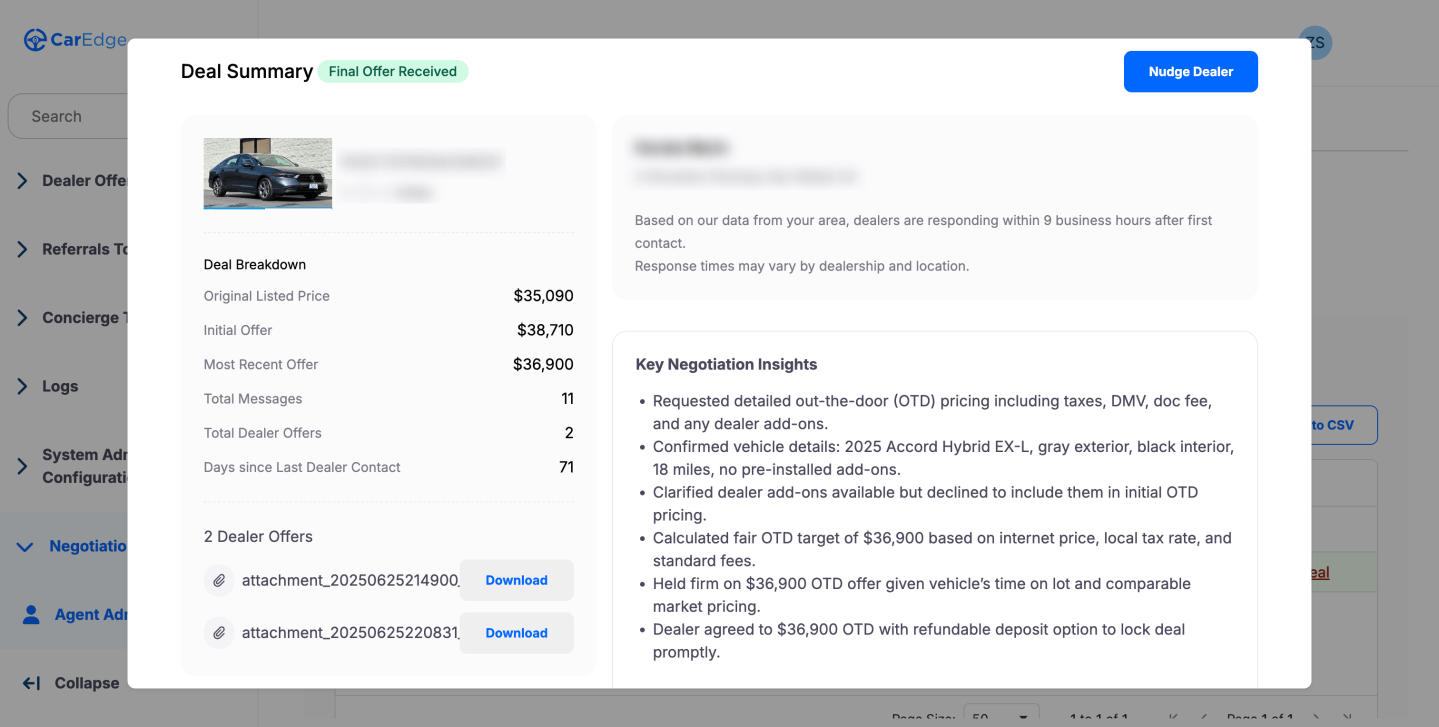Zach Shefska claims his artificial intelligence can negotiate better car deals than most humans ever could. The 30-year-old chief executive of CarEdge, which he founded with his father Ray in July 2020, says his company’s AI negotiator has saved customers thousands of dollars by handling the back-and-forth haggling that typically makes car buying such a dreaded experience.
Shefska told Fortune the AI negotiator took about four months to develop. “We launched it on July 17th and have helped over 2,000 paying customers,” he said. The system is built on top of existing large language models but enhanced with CarEdge’s proprietary market insights and negotiation training. “CarEdge creates instances of AI agents that are deployed on behalf of users. The agents have proprietary market insights and negotiation training from CarEdge. Each agent creates a unique email and phone number and contacts dealers on behalf of customers,” Shefska told Fortune.
The idea emerged from a simple frustration. “Consumers don’t want to get screwed,” Shefska told PYMNTS in an interview. “And it’s not even necessarily about getting the best price; it’s just not wanting to be taken advantage of.”
CarEdge’s AI negotiator works simply: Customers specify exactly what vehicle they want, and the AI creates anonymous email addresses and phone numbers to contact dealerships directly. The artificial intelligence then handles all the price negotiations while keeping the buyer’s personal information completely private.
Notably, the service isn’t free. Customers pay $40 for a month of access without auto-renewal. “Customers pay because we do not want car dealers to be flooded with users who are simply testing the tech,” Shefska told Fortune. “The goal is for only those who are highly qualified and serious shoppers to leverage the agent to help save them time and money.”
According to CarEdge, though, the results speak for themselves. In one example cited by the company, CarEdge’s AI negotiated a Toyota RAV4 from an initial dealer quote of $37,356 down to $35,600—a savings of nearly $1,800. Customer testimonials published on CarEdge’s website show even bigger wins, with the company claiming that one man, Brian G., reported CarEdge helped him get a 2023 Chrysler Pacifica Hybrid for “$4,000 under MSRP after fees.” Another customer testimonial on the site, attributed to Wes S., says he secured a 2023 Corvette C8 for $5,000 under sticker price.
“On average the agent saves users over $1,000 and ~5 hours of back and forth with dealers via email and text,” Shefska told Fortune. CarEdge says the AI negotiator has been deployed over 10,000 times since launching, collecting pricing data from thousands of dealerships across the country.
The negotiation advantage
What gives the AI such an edge? Unlike consumers who buy cars every three to five years, the artificial intelligence negotiates deals constantly, learning from each interaction. CarEdge has fed the system six years of pricing data from hundreds of thousands of car transactions, giving it deep insights into what constitutes a fair deal.
The AI also eliminates the emotional and psychological pressures that often derail human negotiations. It doesn’t get flustered by high-pressure sales tactics or feel rushed to make a decision. Instead, it methodically compares offers, identifies hidden fees, and pushes for better terms with the persistence of a seasoned negotiator.
According to CarEdge, one customer looking for a Honda Accord got to experience the benefits firsthand when the AI negotiator managed 13 back-and-forth messages with a dealer and ultimately saved him $1,280 off the original out-the-door price.
Beyond the financial savings, the AI negotiator addresses another major pain point in car shopping: privacy invasion. Traditional car shopping websites often expose buyers to a barrage of spam calls and emails from multiple dealerships. CarEdge’s system flips this dynamic entirely: The AI absorbs all the dealer communications while the customer stays anonymous until they’re ready to make a purchase.
This approach has resonated with consumers increasingly concerned about data privacy. The AI uses what CarEdge calls “protected alias” contact information, ensuring that dealers never get access to the buyer’s real phone number or email address during negotiations.
Buying cars in the future
CarEdge’s AI negotiator represents part of a larger transformation in how high-value transactions are conducted. Just as real estate has buyer’s agents, Shefska envisions a future where AI agents routinely handle complex negotiations on behalf of consumers.
As artificial intelligence becomes more sophisticated and car buying remains one of consumers’ most stressful retail experiences, tools like CarEdge’s AI negotiator may become standard practice. For an industry built on information asymmetry and adversarial relationships, that change can’t come soon enough.
For this story, Fortune used generative AI to help with an initial draft. An editor verified the accuracy of the information before publishing.

































